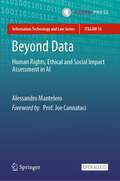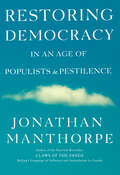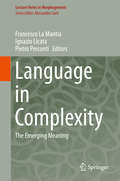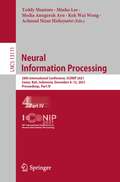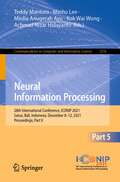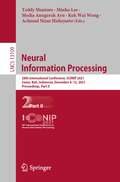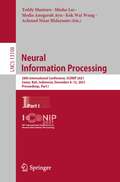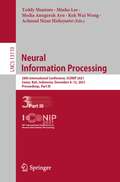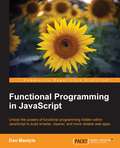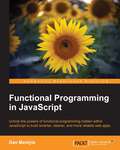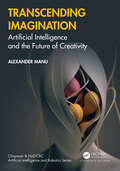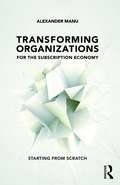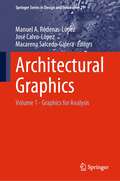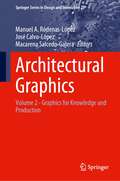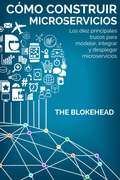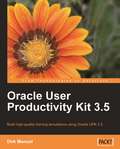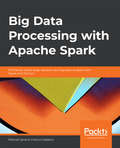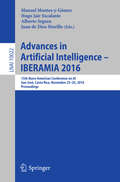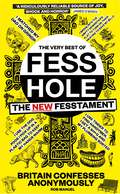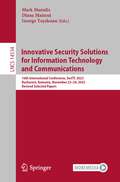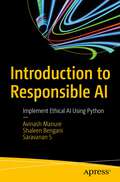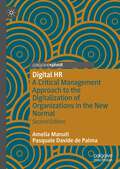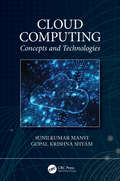- Table View
- List View
Beyond Data: Human Rights, Ethical and Social Impact Assessment in AI (Information Technology and Law Series #36)
by Alessandro ManteleroThis open access book focuses on the impact of Artificial Intelligence (AI) on individuals and society from a legal perspective, providing a comprehensive risk-based methodological framework to address it. Building on the limitations of data protection in dealing with the challenges of AI, the author proposes an integrated approach to risk assessment that focuses on human rights and encompasses contextual social and ethical values. The core of the analysis concerns the assessment methodology and the role of experts in steering the design of AI products and services by business and public bodies in the direction of human rights and societal values. Taking into account the ongoing debate on AI regulation, the proposed assessment model also bridges the gap between risk-based provisions and their real-world implementation. The central focus of the book on human rights and societal values in AI and the proposed solutions will make it of interest to legal scholars, AI developers and providers, policy makers and regulators. Alessandro Mantelero is Associate Professor of Private Law and Law & Technology in the Department of Management and Production Engineering at the Politecnico di Torino in Turin, Italy.
Restoring Democracy in an Age of Populists and Pestilence
by Jonathan Manthorpe“This global affairs veteran has carved out a solid, mature path, including for ‘flawed democracies’ like the U.S. We’d all be wise to follow.” — Vancouver SunFrom the author of the Claws of the Panda, a Globe and Mail bestseller, Restoring Democracy is quite literally a book for our times. Manthorpe argues that democracy is more resilient than it appears, and is capable of overcoming the attacks from within and without that have sapped its vigour since the end of the Cold War. He begins with a description of the events of 1989, one of the seminal years in modern history. This saw the end of the Cold War, and the apparent conclusive victory of democracy and its civic values. But the view of these changes as a triumph of democracy — as summed up in Francis Fukuyama’s essay "The End of History" — was short-lived. Russia, shorn of its Soviet empire, and the Chinese Communist Party, re-examining its survival after the Tiananmen Square Massacre, began devising ways to counter-attack the West’s triumphalism and these met with considerable success. Internal pressures and contradictions — wealth disparity being chief among them — threaten the survival of many democratic systems. Abandoned industrial workers turn to the repeated platitudes designed to appeal to those left behind without actually offering them the ways and means to catch up. Immigrants, refugees, and the reformist fixations of isolated liberal elites have provided ammunition for would-be despots. Adding to the pressures building on the political norms of our democracies, the COVID-19 pandemic has brought economic and social stand-still for which no country is prepared.
Language in Complexity
by Francesco La Mantia Ignazio Licata Pietro PercontiThis contributed volume explores the achievements gained and the remaining puzzling questions by applying dynamical systems theory to the linguistic inquiry. In particular, the book is divided into three parts, each one addressing one of the following topics: 1) Facing complexity in the right way: mathematics and complexity 2) Complexity and theory of language 3) From empirical observation to formal models: investigation of specific linguistic phenomena, like enunciation, deixis, or the meaning of the metaphorical phrases The application of complexity theory to describe cognitive phenomena is a recent and very promising trend in cognitive science. At the time when dynamical approaches triggered a paradigm shift in cognitive science some decade ago, the major topic of research were the challenges imposed by classical computational approaches dealing with the explanation of cognitive phenomena like consciousness, decision making and language. The target audience primarily comprises researchers and experts in the field but the book may also be beneficial for graduate and post-graduate students who want to enter the field.
Mastercam 2019 Training Guide Mill 2D
by Matthew Manton Duane WeidingerMastercam 2019 Mill Essentials Training TutorialThe Mastercam 2019 Mill Essentials Training Tutorial features concept-filled tutorials, challenging practice exercises and short quizzes following every tutorial providing a comprehensive look at geometry creation and 2D toolpathing for Mastercam Mill.This book begins with the absolute basics by introducing the Mastercam user interface and it will have you creating geometry, drilling and creating contour toolpaths before you know it. Its gradual progression lends way to more advanced concepts such as multiple setup scenarios and 2D High Speed Toolpaths. All of the parts within the book are designed with machinability in mind.A multitude of topics are covered including 2D geometry, solid geometry, tool settings, stock setup, drilling, tapping, contouring, pocketing, circle milling and slot milling. You will learn the 2D High Speed Toolpaths such as Dynamic Mill, Area Mill, Dynamic Contour, Peel Mill & Blend Mill, how to import a solid and machine it and using the WCS in multiple fixture applications.This book Includes: Mastercam 2019 Home Learning Edition/Demo Software Mastercam 2019 Mill Essentials Video Training DVD
Neural Information Processing: 28th International Conference, ICONIP 2021, Sanur, Bali, Indonesia, December 8–12, 2021, Proceedings, Part IV (Lecture Notes in Computer Science #13111)
by Teddy Mantoro Minho Lee Media Anugerah Ayu Kok Wai Wong Achmad Nizar HidayantoThe four-volume proceedings LNCS 13108, 13109, 13110, and 13111 constitutes the proceedings of the 28th International Conference on Neural Information Processing, ICONIP 2021, which was held during December 8-12, 2021. The conference was planned to take place in Bali, Indonesia but changed to an online format due to the COVID-19 pandemic. The total of 226 full papers presented in these proceedings was carefully reviewed and selected from 1093 submissions. The papers were organized in topical sections as follows: Part I: Theory and algorithms; Part II: Theory and algorithms; human centred computing; AI and cybersecurity; Part III: Cognitive neurosciences; reliable, robust, and secure machine learning algorithms; theory and applications of natural computing paradigms; advances in deep and shallow machine learning algorithms for biomedical data and imaging; applications; Part IV: Applications.
Neural Information Processing: 28th International Conference, ICONIP 2021, Sanur, Bali, Indonesia, December 8–12, 2021, Proceedings, Part V (Communications in Computer and Information Science #1516)
by Teddy Mantoro Minho Lee Media Anugerah Ayu Kok Wai Wong Achmad Nizar HidayantoThe two-volume set CCIS 1516 and 1517 constitutes thoroughly refereed short papers presented at the 28th International Conference on Neural Information Processing, ICONIP 2021, held in Sanur, Bali, Indonesia, in December 2021.* The volume also presents papers from the workshop on Artificial Intelligence and Cyber Security, held during the ICONIP 2021. The 176 short and workshop papers presented in this volume were carefully reviewed and selected for publication out of 1093 submissions. The papers are organized in topical sections as follows: theory and algorithms; AI and cybersecurity; cognitive neurosciences; human centred computing; advances in deep and shallow machine learning algorithms for biomedical data and imaging; reliable, robust, and secure machine learning algorithms; theory and applications of natural computing paradigms; applications.* The conference was held virtually due to the COVID-19 pandemic.
Neural Information Processing: 28th International Conference, ICONIP 2021, Sanur, Bali, Indonesia, December 8–12, 2021, Proceedings, Part II (Lecture Notes in Computer Science #13109)
by Teddy Mantoro Minho Lee Media Anugerah Ayu Kok Wai Wong Achmad Nizar HidayantoThe four-volume proceedings LNCS 13108, 13109, 13110, and 13111 constitutes the proceedings of the 28th International Conference on Neural Information Processing, ICONIP 2021, which was held during December 8-12, 2021. The conference was planned to take place in Bali, Indonesia but changed to an online format due to the COVID-19 pandemic. The total of 226 full papers presented in these proceedings was carefully reviewed and selected from 1093 submissions. The papers were organized in topical sections as follows: Part I: Theory and algorithms; Part II: Theory and algorithms; human centred computing; AI and cybersecurity; Part III: Cognitive neurosciences; reliable, robust, and secure machine learning algorithms; theory and applications of natural computing paradigms; advances in deep and shallow machine learning algorithms for biomedical data and imaging; applications; Part IV: Applications.
Neural Information Processing: 28th International Conference, ICONIP 2021, Sanur, Bali, Indonesia, December 8–12, 2021, Proceedings, Part I (Lecture Notes in Computer Science #13108)
by Teddy Mantoro Minho Lee Media Anugerah Ayu Kok Wai Wong Achmad Nizar HidayantoThe four-volume proceedings LNCS 13108, 13109, 13110, and 13111 constitutes the proceedings of the 28th International Conference on Neural Information Processing, ICONIP 2021, which was held during December 8-12, 2021. The conference was planned to take place in Bali, Indonesia but changed to an online format due to the COVID-19 pandemic. The total of 226 full papers presented in these proceedings was carefully reviewed and selected from 1093 submissions. The papers were organized in topical sections as follows: Part I: Theory and algorithms; Part II: Theory and algorithms; human centred computing; AI and cybersecurity; Part III: Cognitive neurosciences; reliable, robust, and secure machine learning algorithms; theory and applications of natural computing paradigms; advances in deep and shallow machine learning algorithms for biomedical data and imaging; applications; Part IV: Applications.
Neural Information Processing: 28th International Conference, ICONIP 2021, Sanur, Bali, Indonesia, December 8–12, 2021, Proceedings, Part III (Lecture Notes in Computer Science #13110)
by Teddy Mantoro Minho Lee Media Anugerah Ayu Kok Wai Wong Achmad Nizar HidayantoThe four-volume proceedings LNCS 13108, 13109, 13110, and 13111 constitutes the proceedings of the 28th International Conference on Neural Information Processing, ICONIP 2021, which was held during December 8-12, 2021. The conference was planned to take place in Bali, Indonesia but changed to an online format due to the COVID-19 pandemic. The total of 226 full papers presented in these proceedings was carefully reviewed and selected from 1093 submissions. The papers were organized in topical sections as follows: Part I: Theory and algorithms; Part II: Theory and algorithms; human centred computing; AI and cybersecurity; Part III: Cognitive neurosciences; reliable, robust, and secure machine learning algorithms; theory and applications of natural computing paradigms; advances in deep and shallow machine learning algorithms for biomedical data and imaging; applications; Part IV: Applications.
Functional Programming in JavaScript
by Dan MantylaIf you are a JavaScript developer interested in learning functional programming, looking for the quantum leap towards mastering the JavaScript language, or just want to become a better programmer in general, then this book is ideal for you. It is aimed at programmers involved in developing reactive frontend apps, server-side apps that wrangle with reliability and concurrency, and everything in between.
Functional Programming in JavaScript
by Dan Mantyla<P><P>Unlock the powers of functional programming hidden within JavaScript to build smarter, cleaner, and more reliable web apps <P><P>About This Book <P><P>Discover what functional programming is, why it's effective, and how it's used in JavaScript <P><P>Understand and optimize JavaScript's hidden potential as a true functional language <P><P>Explore the best coding practices for real-world applications <P><P>Who This Book Is For <P><P>If you are a JavaScript developer interested in learning functional programming, looking for the quantum leap towards mastering the JavaScript language, or just want to become a better programmer in general, then this book is ideal for you. It is aimed at programmers involved in developing reactive frontend apps, server-side apps that wrangle with reliability and concurrency, and everything in between. <P><P>What You Will Learn <P><P>Separate core logic from the program state to write more maintainable code <P><P>Replace ugly for loops with pure functions and recursion <P><P>Simplify code with method chains of pure, higher-order functions <P><P>Create more reliable code with closures and immutable data <P><P>Explore lazy evaluation strategies and what they can accomplish <P><P>Develop more powerful applications with currying and function composition <P><P>Use promises, functors, monads, and function factories <P><P>In Detail <P><P>This is a fast-paced guide that will help you to write real-world applications by utilizing a wide range of functional techniques and styles. <P><P>The book first explores the core concepts of functional programming common to all functional languages, with examples of their use in JavaScript. It's followed by a comprehensive roundup of functional programming libraries for JavaScript that minimizes the burden of digging deep into JavaScript to expose a set of tools that makes functional programming not just possible but highly convenient. The book then rounds off with an overview of methods to effectively use and mix functional programming with object-oriented programming.
Transcending Imagination: Artificial Intelligence and the Future of Creativity (Chapman & Hall/CRC Artificial Intelligence and Robotics Series)
by Alexander ManuImagine a world where the boundaries of creativity are not only stretched but redefined. This book serves as your guide to this new frontier, engaging general readers, tech enthusiasts, and creatives alike in the captivating interplay between human ingenuity and artificial intelligence (AI).Journey through the ground-breaking advancements in AI as they intersect with art, design, entertainment, and education. Discover how AI’s power to analyze and understand language can be harnessed to generate breathtaking visuals from mere text descriptions—a process known as text-conditional image generation. But this book goes beyond just showcasing AI’s capabilities: it delves into its transformative effects on the creative process itself. How will artists and designers adapt to a world where they co-create with machines? What are the implications of AI-generated art in educational settings? This book tackles these questions head on, offering a comprehensive view of the changing landscape of creativity.At its core, this book challenges you to rethink what’s possible in the realm of artistic expression. Manu contends that as AI evolves, mastering the art of collaboration between human and machine will become essential. More than just a look into the future, Transcending Imagination: Artificial Intelligence and the Future of Creativity is a roadmap for artists, designers, and educators eager to navigate the uncharted territory of AI-augmented creativity. It is a must-read for anyone interested in how AI might redefine the realms of art, design, and education.
Transforming Organizations for the Subscription Economy: Starting from Scratch
by Alexander ManuThe emerging present is a fast-changing context for incumbent organizations, especially in market segments where online behavior is replacing physical proximity, and users engage with digital platforms for the acquisition of products and services. These are platforms that allow users to behave, to leave a mark, and to participate in the community of others, which are the values people now seek. Transforming Organizations for the Subscription Economy: Starting from Scratch aims to prepare executives for a world in which everything is social, augmented and autonomous; objects and spaces will have multiple purposes, capabilities and meanings. This is a new territory full of opportunity which is generally discussed only at the level of technology involved instead of the intellectual level, where the real understanding of the need for transformation resides. The book reveals ideas about what is possible if we transform the present. The narrative is organized around what is actual and what is potential; what is the probable future that we can arrive at through change, and what is the possible future that we can build through transformation. When engaging in transformation, the following strategic question develops: if you were designing your organization today, how would you design it? In other words, how would you go about it starting from scratch? This book provides the intellectual framework that empowers organizations to understand and navigate the emerging present, and to develop and deliver products and services of intrinsic value to users.
Architectural Graphics: Volume 1 - Graphics for Analysis (Springer Series in Design and Innovation #21)
by Manuel A. Ródenas-López José Calvo-López Macarena Salcedo-GaleraThis book reports on several advances in architectural graphics, with a special emphasis on education, training, and research. It gathers a selection of contributions to the 19th International Conference on Graphic Design in Architecture, EGA 2022, held on June 2–4, 2022, in Cartagena, Spain, with the motto: "Beyond drawings. The use of architectural graphics".
Architectural Graphics: Volume 2 - Graphics for Knowledge and Production (Springer Series in Design and Innovation #22)
by Manuel A. Ródenas-López José Calvo-López Macarena Salcedo-GaleraThis book reports on several advances in architectural graphics, with a special emphasis on education, training and research. It gathers a selection of contributions to the 19th International Conference on Graphic Design in Architecture, EGA 2022, held on June 2–4, 2022, in Cartagena, Spain, with the motto: "Beyond drawings. The use of architectural graphics".
Cómo construir Microservicios: Los diez principales trucos para modelar, integrar y desplegar microservicios
by Manuel Antonio Monroy Correa The BlokeheadEste libro es una exploración acerca de los microservicios y cómo construirlos. Comienza explicando lo que son, así ayudar al lector a lograr un buen entendimiento de los mismos. Después de leer este libro, sabrás cómo y dónde son utilizados los microservicios. Los siguientes tópicos se discuten en este libro: 1. Heterogeneidad tecnológica, resiliencia, sellado y despliegue – Trucos #1 y #2. 2. Administrando sistemas complejos – Trucos “3 y #4. 3. Listas de verificación – Truco #5. 4. Integración – Trucos #6 a # 10. 5. Y mucho, mucho más… Descarga tu copia de Cómo construir microservicios moviendo el cursor hacia arriba y dando click en el botón “Compra ahora con 1-Click”.
Oracle User Productivity Kit 3.5
by Dirk ManuelThis book provides a practical tutorial on UPK's functionality, with the aim of teaching developers how to best leverage this functionality to develop high-quality training material. The book guides readers from the basics of recording through to adding value through Web Pages Packages (Infoblocks), Role filters, Glossaries, and more. The book starts with the recording of a simple simulation, and builds on this recording throughout, by introducing new UPK features and incorporating the lessons learned into this recording. Interwoven into this, the key tasks (how-tos) are formatted in such a way that they can be quickly identified and referred to, making this book useful as an ongoing reference to UPK functionality. This book has been written primarily for new or intermediate training developers who will be using Oracle UPK or OnDemand to create their training material. If you are an experienced UPK developer who wants to tailor UPK to meet your own, specific requirements, you will love this book.
Big Data Processing with Apache Spark: Efficiently tackle large datasets and big data analysis with Spark and Python
by Manuel Ignacio Franco GaleanoNo need to spend hours ploughing through endless data – let Spark, one of the fastest big data processing engines available, do the hard work for you.Key FeaturesGet up and running with Apache Spark and PythonIntegrate Spark with AWS for real-time analyticsApply processed data streams to machine learning APIs of Apache SparkBook DescriptionProcessing big data in real time is challenging due to scalability, information consistency, and fault-tolerance. This book teaches you how to use Spark to make your overall analytical workflow faster and more efficient. You'll explore all core concepts and tools within the Spark ecosystem, such as Spark Streaming, the Spark Streaming API, machine learning extension, and structured streaming.You'll begin by learning data processing fundamentals using Resilient Distributed Datasets (RDDs), SQL, Datasets, and Dataframes APIs. After grasping these fundamentals, you'll move on to using Spark Streaming APIs to consume data in real time from TCP sockets, and integrate Amazon Web Services (AWS) for stream consumption.By the end of this book, you’ll not only have understood how to use machine learning extensions and structured streams but you’ll also be able to apply Spark in your own upcoming big data projects.What you will learnWrite your own Python programs that can interact with SparkImplement data stream consumption using Apache SparkRecognize common operations in Spark to process known data streamsIntegrate Spark streaming with Amazon Web Services (AWS)Create a collaborative filtering model with the movielens datasetApply processed data streams to Spark machine learning APIsWho this book is forData Processing with Apache Spark is for you if you are a software engineer, architect, or IT professional who wants to explore distributed systems and big data analytics. Although you don‘t need any knowledge of Spark, prior experience of working with Python is recommended.
Advances in Artificial Intelligence - IBERAMIA 2016: 15th Ibero-American Conference on AI, San José, Costa Rica, November 23-25, 2016, Proceedings (Lecture Notes in Computer Science #10022)
by Manuel Montes y Gómez, Hugo Jair Escalante, Alberto Segura and Juan de Dios MurilloThis book constitutes the refereed proceedings of the 15 Ibero-American Conference on Artificial Intelligence, IBERAMIA 2016, held in San José, Costa Rica, in November 2016. The 34 papers presented were carefully reviewed and selected from 75 submissions. The papers are organized in the following topical sections: knowledge engineering, knowledge representation and probabilistic reasoning; agent technology and multi-agent systems; planning and scheduling; natural language processing; machine learning; big data, knowledge discovery and data mining; computer vision and pattern recognition; computational intelligence soft computing; AI in education, affective computing, and human-computer interaction.
The Very Best of Fesshole: Britain confesses anonymously
by Rob Manuel'Puerile, reprehensible and very, very funny' Adam Kay'I love Fesshole. Every single one is a masterclass in storytelling' Jay Rayner'Hilarious! The only guide any alien would need to find out what humans are really like' David Schneider'The wild, the wonderful, the frankly unbelievable and the downright disgusting. Under the anonymity of the internet people confess their most embarrassing secrets and it might not be good for their souls, but it's great for the readers!' Richard K Herring It's confession time, folks! Things have been building up inside of you for too long. Secrets you thought you'd never share with another soul are bubbling to the surface begging for release.And where better to let it all out (/laugh at someone else's misfortune) than on the internet.Fesshole is a Twitter account (@fesshole) which allows people to anonymously confess their innermost thoughts, deepest, darkest secrets, and their most outrageously funny faux pas - but will the online world absolve you of your sins?This book contains the greatest confessions to date, and a whole heap of new ones.After all, if you can't confide in strangers on the internet, who can you tell?
The Very Best of Fesshole: The New Fesstament
by Rob Manuel'A ridiculously reliable source of joy, shock and horror' - James O'Brien 'I sometimes read one of those fesses and wonder if I submitted it myself the night before, after a few beers' - James May The anonymous voices of the internet are back, ready to spill their deepest, darkest secrets and side-splitting faux pas.In this eagerly anticipated second coming, Rob Manuel has once again compiled the most jaw-dropping, knee-slapping, and cringe-inducing confessions out there.Prepare to immerse yourself in the seedy underbelly of human nature, where no secret is too taboo, no embarrassment is left unexplored, and laughter knows no bounds. Once again, the online world becomes an unexpected arena of collective catharsis, and this riotous read is an addictive deep dive into our shared guilt.This must have book contains favourite viral confessions, and a whole heap of new ones. After all, if you can't confide in strangers on the internet, who can you tell?
Innovative Security Solutions for Information Technology and Communications: 16th International Conference, SecITC 2023, Bucharest, Romania, November 23–24, 2023, Revised Selected Papers (Lecture Notes in Computer Science #14534)
by Mark Manulis Diana Maimuţ George TeşeleanuThis book constitutes revised selected papers from the thoroughly refereed conference proceedings of the 16th International Conference on Innovative Security Solutions for Information Technology and Communications, SecITC 2023, held in Bucharest, Romania, in November 2023. The 14 full papers included in the book were carefully reviewed and selected from 57 submissions. They focus on all theoretical and practical aspects related to information technology and communications security.
Introduction to Responsible AI: Implement Ethical AI Using Python
by Avinash Manure Shaleen Bengani Saravanan SLearn and implement responsible AI models using Python. This book will teach you how to balance ethical challenges with opportunities in artificial intelligence. The book starts with an introduction to the fundamentals of AI, with special emphasis given to the key principles of responsible AI. The authors then walk you through the critical issues of detecting and mitigating bias, making AI decisions understandable, preserving privacy, ensuring security, and designing robust models. Along the way, you’ll gain an overview of tools, techniques, and code examples to implement the key principles you learn in real-world scenarios. The book concludes with a chapter devoted to fostering a deeper understanding of responsible AI’s profound implications for the future. Each chapter offers a hands-on approach, enriched with practical insights and code snippets, enabling you to translate ethical considerations into actionable solutions. What You Will Learn Understand the principles of responsible AI and their importance in today's digital worldMaster techniques to detect and mitigate bias in AIExplore methods and tools for achieving transparency and explainabilityDiscover best practices for privacy preservation and security in AIGain insights into designing robust and reliable AI models Who This Book Is For AI practitioners, data scientists, machine learning engineers, researchers, policymakers, and students interested in the ethical aspects of AI
Digital HR: A Critical Management Approach to the Digitalization of Organizations in the New Normal
by Amelia Manuti Pasquale Davide de PalmaThis book draws on recent debate surrounding the emergence of cognitive intelligence in organizations, exploring the redefinition of the labor market and consequently, employment. Now in its second edition, it has been re-conceived to reflect the huge transformation experienced by organizations and individuals following the COVID-19 pandemic, which has changed our understanding of the meaning of working and has reshaped HRM and its function within organizations. With a particular focus on Human Resource Management (HRM), the authors analyse the socio-cultural transformation of traditional practices and methodologies that are occurring in the workforce. Digital HR presents detailed case studies and interviews with HR managers of large multinational companies, providing comprehensive empirical evidence for academics and students interested in the development of HRM in today’s digital landscape. The book will also be valuable to practitioners and managers looking to adapt the role of HR in their own companies or organizations.
Cloud Computing: Concepts and Technologies
by Sunilkumar Manvi Gopal ShyamComprehensive and timely, Cloud Computing: Concepts and Technologies offers a thorough and detailed description of cloud computing concepts, architectures, and technologies, along with guidance on the best ways to understand and implement them. It covers the multi-core architectures, distributed and parallel computing models, virtualization, cloud developments, workload and Service-Level-Agreements (SLA) in cloud, workload management. Further, resource management issues in cloud with regard to resource provisioning, resource allocation, resource mapping and resource adaptation, ethical, non-ethical and security issues in cloud are followed by discussion of open challenges and future directions. This book gives students a comprehensive overview of the latest technologies and guidance on cloud computing, and is ideal for those studying the subject in specific modules or advanced courses. It is designed in twelve chapters followed by laboratory setups and experiments. Each chapter has multiple choice questions with answers, as well as review questions and critical thinking questions. The chapters are practically-focused, meaning that the information will also be relevant and useful for professionals wanting an overview of the topic.
